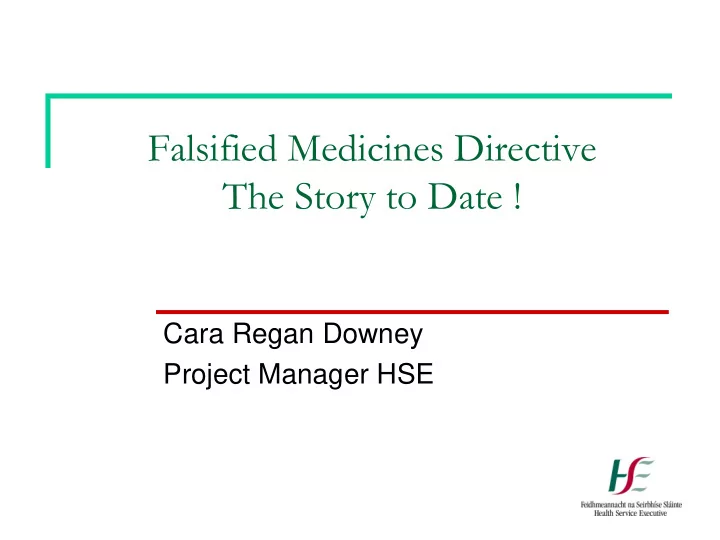

Falsified Medicines Directive The Story to Date ! Cara Regan Downey Project Manager HSE
What is the Falsified Medicines Directive Falsified Medicines Directive is European legislation aimed to prevent falsified medicines infiltrating the legal supply chain and ultimately from reaching patients.
The EU passed legislation in 2011 and Ireland passed legislation on the 12th February 2019 which includes: Measures to tackle the threat: A requirements for medicine packs to carry special safety features in the form of an anti-tamper device (e.g. foil seal, breakable cap) and a barcode containing ‘unique identifiers’ (including a serial number) to enable the authenticity of the pack to be checked prior to dispensing. A common, EU-wide logo to identify legal online medicines suppliers , making it easier to distinguish them from illegal operators.
Why? Number 1 reason – Patient Safety Minister Simon Harris 8 th February 2019 “These new requirements will enhance patient safety by protecting the medicines supply chain from infiltration by counterfeit medicines and introducing new rules to more rigorously regulate the supply chain. “While there has been no risk or reported incidents to date at pharmacy level from fake medicines in Ireland, other European countries have had issues. This new national system provides further security and protection for Irish and European patients now and into the future .”
Where? Healthcare Institutions The directive mandates that all “Healthcare Institutions” must perform the decommissioning activity themselves before dispensing medicine. Through a number of workshops with the DOH, the definition of a “Healthcare Institution” has been defined as a hospital and an in or outpatient clinic under the control and management of a hospital, or a health centre under the control and management of a hospital. Non – “Healthcare Institutions” Any other location not considered a “Healthcare Institution”, but who also dispense medicine, are also considered in-scope for the FMD, but the directive allows for some flexibility to allow these locations to request their wholesaler to carry out the decommissioning activity on their behalf. This is covered under Article 23 of the directive and is known as an “Article 23 derogation ”.
Installation to date 38 acute hospitals 24 voluntary bodies Of the acute locations, 37 required pharmacy and laboratory decommissioning installations and some of the larger hospitals required additional installations in the wards and stores. 98 community locations availed of an Article 23 derogation and requested that their wholesaler(s) carry out the decommissioning activity on their behalf.
Where? Within the Health Services the primary area of delivery of medicines for patients was the Pharmacy Department and this was the main focus for a software and hardware solution at the start of this project However …………………. Over the course of the project it became evident that other areas within hospitals needed this support also including Blood Transfusion Laboratories Stores Wards
How?
More surprises but a welcome one! Use and Learn In early February and following discussions at a national and European level with stakeholder representatives, the Minister for Health decided pragmatic approach was to be adapted to the implementation of the Delegated Regulation (and the associated statutory instrument) after the go live date, to ensure the continuity of safe supply of medicines to patients while all parties gain a better understanding of the new system. This means that: All medicinal products released by MAH’s for the Irish Market after Feb 9th should bear the safety features as required i.e. a tamper proof seal and 2D barcode During the initial period of operation, the system will be considered to be in ‘use and learn’ phase. Therefore wholesalers, pharmacies and hospitals should scan medicines bearing the safety features and if an alert is flagged, should continue to supply packs to patients in accordance with their existing procedures, unless they have overriding concerns that a falsified medicine is involved.
The majority of the alerts that the system can generate upon scanning a pack will not appear during this ‘use and learn’ phase but will be forwarded by the system to the IMVO, the HPRA and the pharmaceutical companies so that they can be investigated and monitored. Notwithstanding the above, if a healthcare professional or wholesaler has reason to believe that packaging has been interfered with, based on their examination of the anti-tampering device on the pack, they must report their concern to the HPRA (as a suspected quality defect via the usual reporting mechanisms) and not supply the pack. National legislation including the provisions of Article 23 of the Delegated Regulation will be introduced, however, the offences provided for in the Regulations will not be commenced for a period of time to let the new system bed in. This will be reviewed again in three months’ time. This approach will ensure that medicines continue to be provided to patients without delay and also ensure that all stakeholders, manufacturers, wholesalers, pharmacists and other healthcare professionals work to build confidence in operating the new safety system.
Next steps An SOP has been issued to pharmacies in draft but now needs to be finalised however for the labs it’s a bit more difficult given that they are accredited so we now are putting together an expert group to review and create a separate SOP I will be visiting a number of sites (if invited!) to ensure that this process goes as smoothly as possible and assist where possible. We have requested along with the IMVO that the use and learn is extended and suggested a year but we will have to see what happens An aggregated solution is has been developed and we are working with United Drug and Uniphar with regards to this.
Thank You Question time
Recommend
More recommend